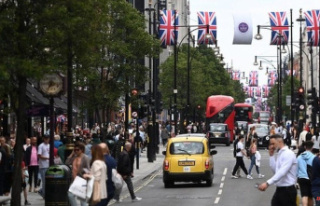Boris Johnson has pledged not to make big policy decisions that would tie up the hands of the Conservative Party's chosen replacement as prime minister.
Downing Street stated that the government will only focus on implementing policies that have been approved.
Johnson has appointed ministers to the positions created by the mass walkout which led to his resignation.
He insists that the government will not "take its feet off the gas" in delivering on its manifesto promises.
However, a change in the prime minister means that there are always big challenges and major decisions to be made.
These are the most pressing issues facing this government.
Before the turmoil of this week, Johnson and Rishi Sunak, his former Chancellor, had set a date in their calendar - a major joint speech about the economy on 12 July.
Some of the proposals were to cut VAT and income taxes, as well as delaying a planned rise for corporation tax.
In his resignation letter, Mr Sunak stated clearly that his approach on these issues was fundamentally different from that of the prime Minister.
Faisal Islam, BBC Economics Editor, says there was talk about a review of all fiscal policies with "nothing on the table" when Nadhim Zahawi was appointed.
All of this can be parked now that the Conservatives have chosen a leader. The issue of spending and tax will likely feature heavily in the contest, especially since Mr Sunak has joined the race.
Faisal Islam says that if the Tory leadership campaign lasted only a few weeks, it would not be much of a problem. This could pose a problem, as it is likely to last for months.
Boris Johnson openly admits that the greatest domestic challenge facing his government is the cost of living crisis.
He was expected to host regular press conferences before he announced his resignation to highlight the government's efforts to help.
These won't happen now, Downing Street stated.
When asked if the government would intervene in the event that the cost of living crisis got worse, the PM's spokesperson said that the government wouldn't seek to introduce fiscal measures which would have a "significant effect" on the next prime minster.
He said that there were already measures in place to alleviate the cost of living, such as the reduction to National Insurance.
Wage increases are required due to the rising cost of fuel and food.
Rail workers and barristers have been on strike to get better pay. Teachers and nurses unions have suggested that they might also go on strike.
The former Chancellor Rishi Sunak promised that public sector workers would receive "fair and affordable" pay increases last year. A public sector pay review continues despite his resignation.
Many of the decisions regarding the annual pay settlements were made in the last days of July in past years.
Strikes could result from lower pay increases than inflation, but it is not clear if a temporary government would be able to offer an increase above inflation.
Inflation at an all-time high of 40 years and headed for double digits means that any decision on this matter, including whether Treasury funds rises greater than 2-3%, won't be made until the long conclusion of a leadership race.
The government introduced a bill to end parts of the deal it had with the EU regarding trade in Northern Ireland after Brexit.
The EU was very critical of the bill, stating that it was illegal and would not be implemented.
Tim Durrant is a member of the Institute for Government think-tank. According to Durrant, "There are strong feelings within the Tory party about the NI Protocol issue and it will be a major topic during the leadership race."
There are still several stages for the legislation to pass Parliament, and it is unlikely that they will be finished before the autumn.
This means that a new prime Minister could choose to continue with the same policy, or change its direction.
Some Conservative MPs were delighted by the plan to privatize Channel 4, but others felt deeply uncomfortable.
Nadine Dorries, Culture Secretary, has claimed that government ownership is holding back the channel.
However, opposition was likely to be raised in Parliament, especially the House of Lords.
The bill has yet to be introduced to Parliament. A new prime minister may decide to can it instead of facing a potentially difficult battle.
Are you in office, but not in power? What can a "caretaker" government do?
The principle is that big decisions must be made by the successor to the Johnson continuity administration.
There are no new laws, policies or public appointments that would require major changes.
Problem is, unexpected events can happen.
Even interim governments have to continue to govern and take any urgent actions. This one is facing a cost-of-living crisis, a war with Ukraine, and a pandemic that continues to engulf its ranks.
It may need to do some very large things as a response. Non-urgent policy changes, however, are currently on hold.
This is the Cabinet Manual, the rulebook for senior ministers. It is the key text. Top civil servants will be left to manage the gray areas surrounding what is urgent and what can wait for the new leadership.
Dr Catherine Haddon, Institute for Government think tank, says that "it becomes about responsible decision making."
Senior civil servants must navigate this situation when prime ministers are forced to resign, lose confidence votes, or call for an election.












